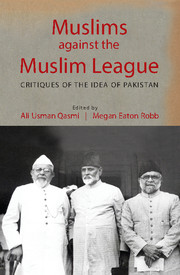Book contents
- Frontmatter
- Contents
- Acknowledgements
- Introduction
- 1 Maulana Husain Ahmad Madani and the Jami'at ‘Ulama-i- Hind: Against Pakistan, against the Muslim League
- 2 The Partition Conundrum: Perspectives, Experiences and Ambiguities from qasbahs in India
- 3 Choudhary Rahmat Ali and his Political Imagination: Pak Plan and the Continent of Dinia
- 4 Differentiating between Pakistan and Napak-istan: Maulana Abul Ala Maududi's Critique of the Muslim League and Muhammad Ali Jinnah
- 5 Advising the Army of Allah: Ashraf Ali Thanawi's Critique of the Muslim League
- 6 The Illusory Promise of Freedom: Mian Iftikhar-ud-Din and the Movement for Pakistan
- 7 Visionary of Another Politics: Inayatullah Khan ‘al-Mashriqi’ and Pakistan
- 8 Nonviolence, Pukhtunwali and Decolonization: Abdul Ghaffar Khan and the Khuda'i Khidmatgar Politics of Friendship
- 9 Islam, Communism and the Search for a Fiction
- 10 Muslim Nationalist or Nationalist Muslim? Allah Bakhsh Soomro and Muslim Politics in 1930s and 1940s Sindh
- 11 Dancing with the Enemy: Sikander Hayat Khan, Jinnah and the Vexed Question of ‘Pakistan’ in a Punjabi Unionist Context
- 12 Religion between Region and Nation: Rezaul Karim, Bengal, and Muslim Politics at the End of Empire
- 13 ‘The Pakistan that is going to be Sunnistan’: Indian Shi'a Responses to the Pakistan Movement
- 14 The Baluch Qaum of Kalat State: Challenging the Ideological and Territorial Boundaries of Pakistan
- Contributors
- Index
8 - Nonviolence, Pukhtunwali and Decolonization: Abdul Ghaffar Khan and the Khuda'i Khidmatgar Politics of Friendship
Published online by Cambridge University Press: 28 February 2018
- Frontmatter
- Contents
- Acknowledgements
- Introduction
- 1 Maulana Husain Ahmad Madani and the Jami'at ‘Ulama-i- Hind: Against Pakistan, against the Muslim League
- 2 The Partition Conundrum: Perspectives, Experiences and Ambiguities from qasbahs in India
- 3 Choudhary Rahmat Ali and his Political Imagination: Pak Plan and the Continent of Dinia
- 4 Differentiating between Pakistan and Napak-istan: Maulana Abul Ala Maududi's Critique of the Muslim League and Muhammad Ali Jinnah
- 5 Advising the Army of Allah: Ashraf Ali Thanawi's Critique of the Muslim League
- 6 The Illusory Promise of Freedom: Mian Iftikhar-ud-Din and the Movement for Pakistan
- 7 Visionary of Another Politics: Inayatullah Khan ‘al-Mashriqi’ and Pakistan
- 8 Nonviolence, Pukhtunwali and Decolonization: Abdul Ghaffar Khan and the Khuda'i Khidmatgar Politics of Friendship
- 9 Islam, Communism and the Search for a Fiction
- 10 Muslim Nationalist or Nationalist Muslim? Allah Bakhsh Soomro and Muslim Politics in 1930s and 1940s Sindh
- 11 Dancing with the Enemy: Sikander Hayat Khan, Jinnah and the Vexed Question of ‘Pakistan’ in a Punjabi Unionist Context
- 12 Religion between Region and Nation: Rezaul Karim, Bengal, and Muslim Politics at the End of Empire
- 13 ‘The Pakistan that is going to be Sunnistan’: Indian Shi'a Responses to the Pakistan Movement
- 14 The Baluch Qaum of Kalat State: Challenging the Ideological and Territorial Boundaries of Pakistan
- Contributors
- Index
Summary
maydān tâ waẗey yū da meynay muhabat da pāra
da khudaǝ makhlūq ẗa wasyaẗ kṛu da ūlfaẗ da pāra
we've come onto the battle-field for the sake of love and affection counseling god's creatures for the sake of loving friendship
The Qissa Khani Bazaar had yet another tale to recount: the slaying of hundreds of unarmed Khuda'i Khidmatgars as they poured into its narrow lanes to protest the arrest of their leaders. When the colonial authorities sent armoured cars to control a crowd they claimed was dangerous, they ran down many Peshawar city dwellers as well; consequently, some in the crowd set fire to the tanks. Others, probably the women in the apartments above the narrow streets witnessing the Indian Army's heavy-handed brutality, pelted the army officers below with stones. And even though the soldiers fired upon the crowd, inevitably killing and injuring many in the tight confines of the bazaar, the most surprising event in the three days of rioting that ensued throughout the Province after the 23 April 1930 Qissa Khani shootings was the refusal of two platoons of the Indian Army's Garhwali Regiment to fire upon the crowd.
Echoing, yet inverting, the Jallianwala Bagh massacre of 1919, the killings in the historic storytellers’ bazaar also created shock waves throughout India. The ruthless policing of the Province for over a year after this incident, and the Khuda'i Khidmatgar's nonviolent resistance, made this a pivotal moment both for the nationalist movement and the North-West Frontier in the annals of Indian independence. While the Garhwali Regiment's refusal to fire upon the protestors substantiated the fact that they were unarmed and not an unruly crowd that required ‘disciplining,’ as the British authorities quite defensively maintained. It was a pivotal moment for many other reasons as well: it made the rest of India aware of the extraordinary fact that a large nonviolent resistance ‘army’ existed in the volatile North-West Frontier Province, whose ranks were, even more surprisingly, composed largely of Pashtuns or Pukhtuns – a fact which undermined a long history of racial representations of the inherently violent ‘Pathans.’ After the Peshawar Riots, the deliberate and brutal imperial policing swelled the ranks of the Khuda'i Khidmatgars even more dramatically from a few hundred volunteers to many thousands; eventually most people in the Province either belonged to the movement or had family members who did.
- Type
- Chapter
- Information
- Muslims against the Muslim LeagueCritiques of the Idea of Pakistan, pp. 220 - 254Publisher: Cambridge University PressPrint publication year: 2017
- 1
- Cited by

